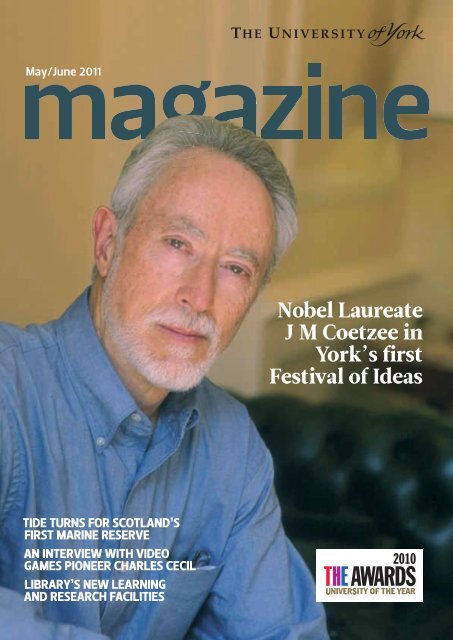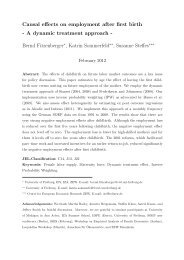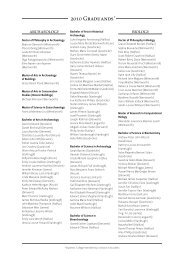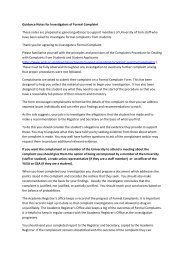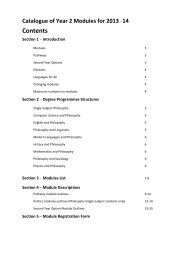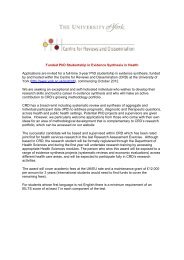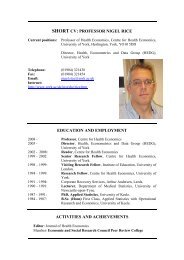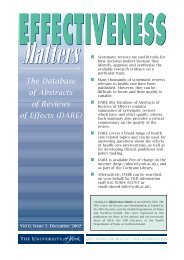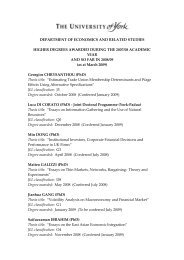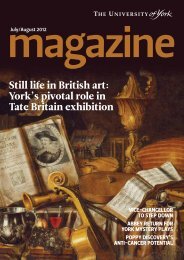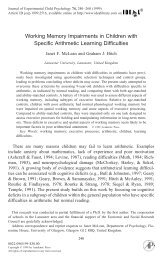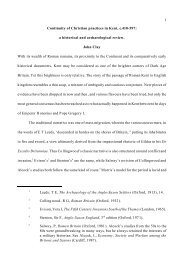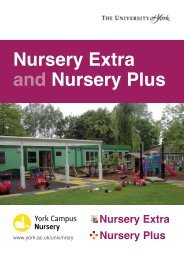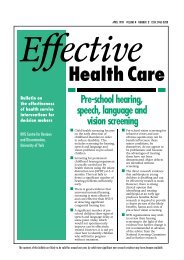May/June 2011 - University of York
May/June 2011 - University of York
May/June 2011 - University of York
- No tags were found...
Create successful ePaper yourself
Turn your PDF publications into a flip-book with our unique Google optimized e-Paper software.
the university <strong>of</strong> york magazineNEwS3New awards recognise excellenceThe new Vice-Chancellor’s Awards for Outstanding Achievementaim to recognise and reward staff and students who are makinga particularly significant contribution towards key elements in the<strong>University</strong> Plan.The awards are divided intocategories corresponding to thePlan’s four themes – Excellence,Internationalisation, Inclusivity andSustainability.In this first year, a total <strong>of</strong> 68 groups orindividuals were nominated and the goldand silver award winners were chosen by apanel chaired by Vice-Chancellor Pr<strong>of</strong>essorBrian Cantor and members <strong>of</strong> the <strong>University</strong>’sSenior Management Group. He presentedthe awards to the gold award winners at ameeting <strong>of</strong> <strong>University</strong> Court in <strong>May</strong>.“These new awards recognise members<strong>of</strong> the <strong>University</strong> who are making anoutstanding contribution towards achievingthe <strong>University</strong> Plan’s principal themes,” saidPr<strong>of</strong>essor Cantor. “The judging panel had adifficult task in deciding the winners fromextremely high calibre entries, who deserveevery congratulation for their outstandingachievements.”Winners in the gold category are:the CNAP Artemisia Research team, JonMeacock (Project Director for HeslingtonEast), Pr<strong>of</strong>essor Howard Wilson (Physics),Ellen Roberts (Social Policy and Social Work),Pr<strong>of</strong>essor Simon Duckett (Chemistry),Pr<strong>of</strong>essor Gary Green (Psychology),Andrew Clemo, Simon Donnelly, Ben Keaneand Chris Caudwell (<strong>University</strong> ChallengeTeam 2010–11), Pr<strong>of</strong>essor Sultan Barakat(PDRU), the Centre for Lifelong Learning,the Athena SWAN team <strong>of</strong> the Department<strong>of</strong> Chemistry, Kate Harper and the Kids CollegeTeam, Dr John Sch<strong>of</strong>ield and Rachel Kiddey(Archaeology), the Music Education Group, theGreen Chemistry Centre <strong>of</strong> Excellence, GordonEastham and his Estates team, Callum Robertsand the Marine Research Group and JamesCollege Junior Common Room.“The judging panelhad a difficult task indeciding the winnersfrom extremely highcalibre entries”Teaching Awards <strong>2011</strong>Twelve Vice-Chancellor’s TeachingAwards will be presented at thissummer’s graduation ceremonies.The awards recognise staff (eitherindividually or in teams) andpostgraduates or postdocs whodemonstrate excellence in teachingand/or learning support at <strong>York</strong>.Award winners are: Phil Lightfoot(Physics), Liat Levita (Psychology), thePlasma Physics and Fusion Group (BenDudson, Kieran Gibson, John Pasley,Greg Tallents, Roddy Vann, HowardWilson, Nigel Woolsey and RachaelStephenson), the Field ArchaeologyTeam (Steve Roskams, Cath Neal,Helen Goodchild, Penny Spikins,Andrea Dugdale, Allan Hall and AndrewNeedham), Vivien Burrows (Economicsand Related Studies), Barbara Gribling(History), Christopher Hogg (Theatre,Film and TV), Chris Poskitt (ComputerScience), Marta Szreder (Languageand Linguistics), Adam Tuff (Physics),Pragya Vohra (History), and IsabelleWinder (Archaeology).Photo by Ian MartindaleRoses victory for <strong>York</strong>The <strong>University</strong> secured a convincing victoryat the <strong>2011</strong> Roses tournament in <strong>May</strong>, beatingLancaster <strong>University</strong> by over 70 points. Morethan 2,000 students participated in over 25different sports, including rugby which washosted at the <strong>York</strong> City Knights stadium.Thousands <strong>of</strong> spectators, including a largegroup <strong>of</strong> alumni, gathered along the Ouseto watch the rowing. The <strong>University</strong>’s BoatClub President, Rosy Temple, competed inthe Women’s IV and VIII, and commented,“It was really exciting to have such greatsupport for the <strong>University</strong>, right in thecentre <strong>of</strong> <strong>York</strong>.”Royal SocietyhonourPr<strong>of</strong>essor JohnGoodby, <strong>of</strong> theDepartment <strong>of</strong>Chemistry, wasamong 44 newFellows announced bythe Royal Society on18 <strong>May</strong>.Election to the Fellowship <strong>of</strong> the RoyalSociety is recognised worldwide as asign <strong>of</strong> the highest regard in science.Candidates must be proposed by at leasttwo existing Fellows and are assessed bySectional Committees in each major field<strong>of</strong> science.Pr<strong>of</strong>essor Goodby’s research focuseson the use <strong>of</strong> liquid crystals in a range<strong>of</strong> high technology applications,including large area flat panel displays,microdisplays, sensors, imaging devices,biomedical materials, surface coatings,and smart adhesives.
4the university <strong>of</strong> york magazineNEwSNEWS IN BRIEFThe Annual Conference for the Association<strong>of</strong> <strong>University</strong> Directors <strong>of</strong> Estates (AUDE)was hosted by the <strong>University</strong> in Apriland organised by <strong>York</strong> Conferences.AUDE promotes excellence in the strategicplanning, management, operation anddevelopment <strong>of</strong> Higher Education estatesand facilities. The conference programmecomprised sessions on financial andenvironmental sustainability in the HigherEducation sector, including a transatlanticvideolink with Harvard <strong>University</strong> and akeynote speech from Sir Alan Langlands,CEO <strong>of</strong> HEFCE.<strong>York</strong> students from China were able tohear about the experience <strong>of</strong> alumniliving and working in China through anew online ‘China Link’ forum held inMarch. The first <strong>of</strong> its kind on <strong>of</strong>fer fromUK Careers Services, the China Link <strong>2011</strong>forum enabled current <strong>York</strong> studentsto learn about the realities <strong>of</strong> workinglife back home in China. The forum hadaround 1300 views throughout the weekby Chinese students, alumni and Chinabasedemployers. The discussions werearchived in a blog resource for ongoinguse to help students inform their careerplanning. “Projects like this are vital to ourfuture development,” said postgraduatestudent, R Hu, who took part in the forum.“It is very important for Chinese studentsto be connected to the home employmentmarket when studying in the UK.”The Department <strong>of</strong> ChemistryUndergraduate Admissions team has beenshortlisted for the Outstanding StudentAdmissions Team at the Times HigherEducation (THE) Leadership andManagement Awards <strong>2011</strong>; the winnerswill be announced on 16 <strong>June</strong>. Theseawards are a highlight <strong>of</strong> the academiccalendar and a celebration <strong>of</strong> the best <strong>of</strong>the sector. Undergraduate applications toChemistry in <strong>York</strong> have had a 100%growth over the past five years,significantly outperforming the nationalchemistry statistics. Pr<strong>of</strong>essor RichardTaylor, Head <strong>of</strong> Department, noted thatthis “is well deserved recognition <strong>of</strong> thehard work and enthusiasm <strong>of</strong> theadmissions team and their commitmentto the personal approach to applicants.”Speeding into energy futureThis spring a team <strong>of</strong> scientists led by <strong>York</strong>’sPlasma Physics and Fusion group conductedan experiment at the Vulcan laser facilityin Oxfordshire, to study how an intenselaser produces beams <strong>of</strong> electrons movingat relativistic speeds – speeds which are asignificant proportion <strong>of</strong> the speed <strong>of</strong> light.The research aims to achieve suitableconditions for a process called ‘fast ignition’which may be used to heat fusion energyexperiments. Fast ignition conditions requireextremely high electrical currents, <strong>of</strong> theorder <strong>of</strong> millions <strong>of</strong> ampères (by comparison,a kettle draws a current <strong>of</strong> 9 amps), containedin a laser beam a fraction <strong>of</strong> the width <strong>of</strong> ahuman hair.Teams from the Department <strong>of</strong> Biologyand Stockholm Environment Institute (SEI)were winners in two <strong>of</strong> the categories in thecity-wide <strong>York</strong> Cycle Challenge. The eventwas held over three weeks and involved 54teams representing major employers across<strong>York</strong>. The combined efforts <strong>of</strong> the hundredsIn the experiment, x-ray measurementtechniques were used to measure thecurrents and spreading <strong>of</strong> a relativisticelectron beam in dense plasmas.Each measurement was completed inapproximately 1 picosecond (one millionth<strong>of</strong> one millionth <strong>of</strong> a second!). The team(including three <strong>York</strong> PhD students as wellas research staff from <strong>York</strong> and other UKinstitutions, Germany and Russia) is nowengaged with the much lengthier task <strong>of</strong>interpreting the data.It is hoped that this research will shedfurther light on processes which can facilitatethe viable production <strong>of</strong> clean, cheap,sustainable fusion energy.<strong>University</strong> rises to cycle challenge<strong>of</strong> people who commuted by bike duringthe challenge period prevented 20,201kilograms <strong>of</strong> CO 2from being released into theenvironment – enough to fill morethan four million balloons. For a fullbreakdown <strong>of</strong> the results, visitwww.yorkcyclechallenge.org.uk.Staff from SEI clocked up 1,413 miles,burned 27,210 calories and saved 245kg <strong>of</strong> CO 2
the university <strong>of</strong> york magazineNEwS5David Kato rememberedIn celebration <strong>of</strong> thelife and struggle <strong>of</strong>courageous gay rightsactivist David Kato, apanel discussion onLGBT and Faith washeld at the <strong>University</strong>on 5 <strong>May</strong>. David wasa Protective Fellowat the Centre forApplied Human Rightsin 2009–10. He was brutally murdered in hishome in Kampala in January.Speakers at the event included CanonJonathan Draper from <strong>York</strong> Minster andGodwyns Onwuchekwa, Co-ordinator<strong>of</strong> Justice for Gay Africans Society. Thediscussions emphasised the need for furtherdialogue around gay rights, particularly withinTheme park goes wild for gold awardIn the park, <strong>University</strong> CIRCLEresearch interns have set up45 bird nest boxes, includingan owl box, and ringed birdsand nest boxes. They arealso developing conservationareas, creating a two hectarewooded area and plantingcornfield flowers to helpmaintain seed stocksfaith communities. There were heartfelttributes from David’s colleagues and thosewho have been touched by David’s struggle.Godwyns described his reaction to David’sdeath: “I could not but weep tears <strong>of</strong> distress;<strong>of</strong> a desire for a better world. But above all,<strong>of</strong> hope for a better future.”“The event was held following asuccessful campaign by the organisation‘Speak Out 4 David Kato’ which called onthe Ugandan-born Archbishop <strong>of</strong> <strong>York</strong>,John Sentamu, to personally condemnhomophobic violence. The Archbishoprecently clarified his position, condemningDavid’s murder and emphasising everyone’sright to enjoy safety and security regardless<strong>of</strong> sexual orientation,” said Lucy Harding<strong>of</strong> the Department <strong>of</strong> Politics, one <strong>of</strong> theevent organisers.STAFF NEWSDr Julian Miller (Electronics)was awarded the Evostaraward at the annualconferences andworkshops in Turin, Italy inApril for his outstandingcontribution to the field <strong>of</strong> evolutionarycomputation.Pr<strong>of</strong>essor Dave Smith(Chemistry) has beenawarded the <strong>2011</strong> RSC‘Bob Hay Lectureship’,given to a younger chemistworking in the field <strong>of</strong>supramolecular chemistry.Dr Verena Görtz (Chemistry)was awarded the BritishLiquid Crystal Society’s <strong>2011</strong>Young Scientist Prize inrecognition <strong>of</strong> her‘significant researchcontributions to the field <strong>of</strong> liquid crystals’.Hilary Blake has joined theDevelopment and AlumniRelations Office team asAnnual Fund Officer. Herrole is to increase supportfor the <strong>York</strong> Annual Fund,run twice yearly telephone campaignsand raise the pr<strong>of</strong>ile <strong>of</strong> the Fund acrosscampus. A <strong>York</strong> alumna (History, 2003,Vanbrugh), Hilary has experience infundraising and volunteer supporthaving worked with Christian Aid andthe Iona Community.Thanks to a pioneering partnership with the<strong>University</strong>, Flamingo Land Theme Park andZoo has won a prestigious 2010 Gold DavidBellamy Conservation Award. The annualawards scheme looks at all aspects <strong>of</strong> parkmanagement from protection <strong>of</strong> plant andanimal habitats to the efficient use <strong>of</strong> energyand recycling.Pr<strong>of</strong>essor David Bellamy, the botanist andvociferous campaigner on environmentalissues, particularly impressed by theconservation work <strong>of</strong> the CIRCLE institute(Centre for the Integration <strong>of</strong> Research,Conservation and Learning), a jointlyfundedventure between the <strong>University</strong>’sEnvironment Department and Flamingo Land,based at the theme park. “The role <strong>of</strong> themodern zoo is to educate the public and toconserve global biodiversity,” said Dr AndyMarshall, Director <strong>of</strong> Conservation at FlamingoLand and lecturer in the EnvironmentDepartment. “At Flamingo Land we are doingthis through our Udzungwa Forest Project,which involves working with local peopleand researchers in Tanzania to conservethreatened species and local habitats.”Dr TT Arvind (Law) wasawarded the ICLQ YoungScholar Prize 2010 for hisarticle ‘The “TransplantEffect” in Harmonisation’(2010) 59 ICLQ 65-88.Maria Goddard (Centrefor Health Economics)has been elected aFellow <strong>of</strong> the LearnedSociety <strong>of</strong> Wales in itsinaugural election.Dr Peter Rudd (Institutefor Effective Education) hasjoined the IEE as a Reader,focusing on the theme <strong>of</strong>overcoming educationaldisadvantage. He works inthe areas <strong>of</strong> school improvement, schooleffectiveness, raising attainment,overcoming the barriers to educationalachievement, and using new technologiesfor teaching and learning.
6the university <strong>of</strong> york magazineNEwSStem cellresearch inthe spotlightAdvances in stem cell science werethe focus <strong>of</strong> a major conferenceat the <strong>University</strong> in March whichdrew researchers from acrossthe world.The UK Stem Cells Network’s annualconference showcased potential rolesfor stem cells in the understanding,prevention and treatment <strong>of</strong> cancer,osteoarthritis, damage to the larynx,inflammatory disease, and Parkinson’sdisease. Delegates also considereddevelopments in our understanding <strong>of</strong> thefundamental biology <strong>of</strong> stem cells and thechallenges <strong>of</strong> producing and using stemcells in a clinical environment.Speakers included US developmentalbiologist Pr<strong>of</strong>essor Gail Martin andPr<strong>of</strong>essor Martin Birchall, who led theteam which successfully performed theworld’s first stem-cell based, tissueengineeredorgan transplant.Dr Paul Genever <strong>of</strong> the Department<strong>of</strong> Biology was among scientists whopresented papers during the three-dayconference. He described his work togrow mesenchymal stem cells (MSCs) –currently one <strong>of</strong> the leading candidatesto be used in stem cell therapies – as tinyspheres. Under these conditions MSCsshow potential to become a variety <strong>of</strong>different cell types including, possibly,the early precursors to heart muscle cells.MSCs are common in children and adultsand quite easy to find in blood, bonemarrow, and many other tissues.On the eve <strong>of</strong> the conference, theUKNSCN screened the UK premier <strong>of</strong> thefilm Indestructible, the story <strong>of</strong> filmmakerBen Byer’s three-year battle against ALS,a type <strong>of</strong> motor-neurone disease, whichincluded travelling to a stem cell clinicin China.In parallel with the conference,the Department <strong>of</strong> Biology staged twoperformances <strong>of</strong> a poignant dramawhich explored the social and ethicalimplications <strong>of</strong> stem cell research.Audiences <strong>of</strong> 14-to 18-year-old pupilsfrom schools across <strong>York</strong>shire saw thedrama by award-winning playwrightJoy Wilkinson. It was commissioned byThe Biochemical Society to markits centenary.The chairman <strong>of</strong> The BiochemicalSociety, Pr<strong>of</strong>essor Colin Kleanthous,<strong>of</strong> the Department <strong>of</strong> Biology,said, “This thought-provoking play is ahighly effective way <strong>of</strong> introducingissues around stem cell research to ayoung audience.”An international approach to equalityDr Irene D’Amico (pictured far right with other delegates)This April Dr Irene D’Amico represented theDepartment <strong>of</strong> Physics and the UK at the4th IUPAP (International Union <strong>of</strong> Pure andApplied Physics) International Conferenceon Women in Physics in Stellenbosch,South Africa.Over 200 physicists from over 60countries attended the conference, tocelebrate the contribution <strong>of</strong> women in thissector <strong>of</strong> science, as well as to debate recentscientific results. The event was openedby South Africa’s Minister for Science andTechnology, Ms Naledi Pandor, who deliveredan inspiring speech about the role <strong>of</strong>education in the future <strong>of</strong> South Africa.The ‘Climategate’ affair in 2009 led tospeculation that some scientific data aboutglobal warming was manipulated by topscience researchers.In order to rebuild public trust in climatechange science, an event was hosted by the<strong>University</strong> in March which saw the UK’s topscience communicators give advice to earlycareer scientists.The workshop was organised by PhDstudents Andrew Suggitt and Alex Bell, both<strong>of</strong> the Department <strong>of</strong> Biology.“There was a tendency, particularly afterthe Climategate incident, for the scientificcommunity as a whole not to put their headsabove the parapet. This was wrong, and Ithink we need to take collective responsibilityfor that. The workshop was our way <strong>of</strong> doingthis, equipping the next generation with thecommunication tools we need to improve thesituation,” explained Andrew.The audience <strong>of</strong> 100 attendees, from abroad range <strong>of</strong> universities and disciplines,heard from experts in the field, includingrepresentatives from the British Council, theScience Media Centre and the Independentnewspaper. There were also plenty <strong>of</strong>opportunities for discussion throughout,In their presentation, the UK teamdescribed national initiatives from theInstitute <strong>of</strong> Physics’ Project Juno to theEquality Act 2010, celebrated recent awardsto female physicists in the UK, and discussedthe UK trends for the percentage <strong>of</strong> women inphysics in recent years.“Contributions from all countriesconsistently depict a physics worldwhich remains male-dominated, withthe percentage <strong>of</strong> female representativesdecreasing towards the top <strong>of</strong> the academichierarchy.“Specific issues vary widely: the Pakistanidelegation advocated social change to givewomen equal rights and status; Irelandidentified the lack <strong>of</strong> female role modelsas a fundamental ‘broken link’; Tanzaniacelebrates its first woman holding a PhD inPhysics, though sexual harassment remainsa problem; Portugal presents probably thehighest percentage <strong>of</strong> female physicists atpr<strong>of</strong>essorial level (24%), but lamented thefact that this appears now to be decreasing,”said Dr D’Amico.“From the conference a general consensusemerged on the importance <strong>of</strong> female rolemodels, <strong>of</strong> gender-aware teaching, <strong>of</strong> clearand transparent criteria for awards and prizes,and <strong>of</strong> mentoring towards closing the gendergap in physics.”Rebuilding trust after ‘Climategate’Pr<strong>of</strong>essor Bob Watsonwith a ‘Question Time’ style debate to wrapup the day.Among the speakers was Pr<strong>of</strong>essor BobWatson, Chief Scientist at the Departmentfor Environment, Food and Rural Affairs,who said, ”I think the public do get climatechange, but they do not always see or feelit happening: especially with a series <strong>of</strong> coldsnowy winters. But the scientific communitydoes need to improve its communicationskills, openly acknowledging what we knowand what we don’t know.”The event was funded by the <strong>University</strong><strong>of</strong> <strong>York</strong>, the British Ecological Society andthe Institute <strong>of</strong> Ecology and EnvironmentalManagement.
the university <strong>of</strong> york magazineNEwS7IN THE COMMUNITY…Lessons in real-world scienceSTAFF NEWSDr Tracey Bywater (Institutefor Effective Education) hasjoined the IEE as a Reader.Her work focuses on thedesign and implementation<strong>of</strong> randomised controlledtrials <strong>of</strong> complex interventions,specifically parent, child, and schoolsprogrammes, to assess behavioural andhealth outcomes for children and theircarers/families.Pr<strong>of</strong>essor Paul Kaye hasbeen appointed AssociateDean for Research at theHull <strong>York</strong> Medical School(HYMS) in addition to hisexisting role as Director <strong>of</strong>the Centre for Immunology and Infection.The highlight <strong>of</strong> the CNAP schools workshop is a chance to use the powerful fluorescence microscope owned by theRaymond Microscopal SocietyPupils from Holmfirth High School wereamong school children across <strong>York</strong>shirelearning how scientists are using the latestgenetic advances to combat malaria.Scientists from the Centre for NovelAgricultural Products (CNAP) are runningworkshops explaining how their ArtemisiaProject is helping improve the supply <strong>of</strong>anti-malarial treatments. The sessions giveteenage pupils a unique insight into howscience learned in the classroom is applied toreal world problems.The free workshop covers plant science,genetics and infectious diseases, andprovides Key Stages 4 and 5 pupils with thechance to work with a powerful fluorescencemicroscope. The microscope is used to lookCycling back to healthThe Environment Department’s Nic Carslawwas diagnosed with breast cancer inJanuary and, following surgery, is now on aprogramme <strong>of</strong> three-weekly chemotherapysessions. Although each chemo sessionknocks her out for a few days, she is able towork and cycle for two weeks out <strong>of</strong> three. Agroup <strong>of</strong> Nic’s friends, the Minster Belles, aretaking part in the Moonwalk in Edinburgh on 11<strong>June</strong> to raise funds for breast cancer supportand research. To coincide with this event, Nicis undertaking a 13-mile cycle ride near <strong>York</strong>,when she will be joined by colleagues fromEnvironment, Chemistry and the StockholmEnvironment Institute. The Minster Belleshave so far raised around £6,000. To sponsorNic visit www.walkthewalkfundraising.org/minster_belles.at trichomes on the surface <strong>of</strong> Artemisiaannua leaves – the clusters <strong>of</strong> glandularcells on the leaf surface that producechemicals, including artemisinin, which isused to treat malaria.The workshops involve a mixture <strong>of</strong>presentation, discussion and hands-onactivities. Pupils learn about the problem <strong>of</strong>malaria and how CNAP is improving supplies<strong>of</strong> an anti-malarial drug from the medicinalherb Artemisia annua, using the latest geneticand analytical technologies.Pr<strong>of</strong>essor Dianna Bowles, CNAP ArtemisiaResearch Project Co-director at the <strong>University</strong><strong>of</strong> <strong>York</strong>, said, “It’s really important to giveschools insight into the work that <strong>University</strong>scientists are doing to benefit society.”Adam Tuff (Physics) haswon the Space Zone section<strong>of</strong> the national scienceoutreach competition, ‘I’ma Scientist, Get me out <strong>of</strong>Here!’, an initiative set upby the Wellcome Trust to help bringscience to life for school pupils.Pr<strong>of</strong>essor James Clark(Chemistry) has beenawarded the RSCEnvironment Prize <strong>2011</strong>. Hisresearch into greenchemical technologiesfocuses on including low temperaturemicrowave activation, heteogeneouscatalysis and supercritical fluid extractionto convert biomass and other wastes tochemical, materials and fuels. His passionis to view ‘waste as future feedstockusing green chemistry’.Dr Stephen Connor(Mathematics) learned to bea Maths busker, and spent amorning busking in Leedscity centre as part <strong>of</strong> theLeeds Festival <strong>of</strong> Science.Maths buskers entertain people withmaths tricks/games in the street, tryingto get them interested in maths. See moreat www.kevinhouston.net/blog.The <strong>University</strong>’s ExecutiveChef Andrew wood is in themix to win an accolade atthe prestigious <strong>2011</strong> CraftGuild <strong>of</strong> Chefs Awards. Hehas been shortlisted in theCost Sector Chef award and will join othertalented chefs from across the UK at aceremony on 2 <strong>June</strong> at the new Park PlazaWestminster Bridge Hotel in London.
the university <strong>of</strong> york magazineNEwS9INTERVIEW …Charles Cecil on the games revolutionIn their 30 years <strong>of</strong> existence, computer games have undergone an extraordinary evolution but,ironically, the vaulting digital advances have enabled the industry to go back to its roots, accordingto video games pioneer Charles Cecil who is working with the <strong>University</strong> on a range <strong>of</strong> projects.Charles Cecil is convinced that theopportunities provided by webpublication mean that, in the world<strong>of</strong> video games, small is once againbeautiful after a period when the mediabehemoths held sway.He was talking during a visit to the<strong>University</strong> to share his reflections on threedecades <strong>of</strong> video game development withstaff, students and the public. He hasan increasingly close relationship withthe <strong>University</strong>, working with a number<strong>of</strong> departments, including Theatre, Filmand Television, Computer Science andArchaeology. He has also led a workshopon interactive narrative with students in theHumanities Research Centre.Cecil is a key player in the industry in<strong>2011</strong> and his involvement stretches back towhen video game development was in itsinfancy. His company, Revolution, is behindthe internationally successful Broken Swordseries <strong>of</strong> games, but the sophistication <strong>of</strong>modern games such as these is a far cry fromthe industry’s beginnings.He recalls, with misty-eyed nostalgia, thetime when Sir Clive Sinclair produced his ZX80computers helping to kick-start an industrythat generates huge revenues.In 1981, an 18-year-old Cecil was askedby a friend to write an adventure game forthe Sinclair ZX81 which at the time was at thecutting edge <strong>of</strong> computer development. Hegave the game the imaginative working title<strong>of</strong> Adventure B – his friend had previouslywritten Adventure A – and was, by his ownadmission ‘very, very basic’. But all thenascent video games were - they werelimited to 16KB and the packaging was asimple lithograph.Cecil says,“It is extraordinary to think <strong>of</strong>the way the industry has developed overthose 30 years commercially, creatively andcertainly technically.”So, is video game developmentcreative endeavour or technicalexercise? Cecil is in no doubt thatit is both.“What makes it unique isthat it is all about creativitybut also it’s about technicalunderstanding,” he says.“I just happen to be verylucky in that I was readingengineering and writingA scene from ‘The Sleeping Dragon’, the third in Games Republic’s Broken Sword seriesstories at the same time. It was the perfectplace to be at the perfect time.”What has changed since the formativeyears is the computing power – the ZX81 had1K <strong>of</strong> memory (Cecil points out that his 32GBiPhone has some 32 million times more). Buthe says the early game developers regardedthis technical constraint as a challenge ratherthan an obstacle.“At that time programmers wereincredibly creative,” he says. “Games werewritten by either one or two people who dideverything. You had the ‘bedroom coder’who would design a game, create thegraphics, they would write the codes, theywould create the music and thenprogramme it. They’d come up withthis funky idea and it was verymuch their vision.“What is so exciting isthat, in many ways, we arereturning to those days andthat’s the reason why theindustry is so dynamic atthe moment. In the ’80swe were communicatingdirectly with our audience and it wasincredibly exciting. I remember the firsttime that somebody came and asked me toautograph one <strong>of</strong> my games, I couldn’t believeit. I was 18 or 19. I felt like a rock star.”As the industry grew and became morepr<strong>of</strong>itable, inevitably the big media companiestook an interest. A complex network <strong>of</strong>publishers, distributors and retailers graduallyreplaced the close relationship that existedbetween game developers and users in theearly years. But Cecil sees digital publicationas rolling back the years.“We have the ability to communicate withand sell directly to our audience,” says Cecilwho co-founded Game Republic, an alliance<strong>of</strong> game developers, and is on the board <strong>of</strong>Screen <strong>York</strong>shire. “It’s incredibly liberatingand it also means we can react quickly towhat people want. It’s actually a much purerway <strong>of</strong> writing, marketing and selling games.”He believes that Revolution has been ableto adapt as the industry has evolved. It hasfew direct employees and works with a smallgroup <strong>of</strong> freelance developers with whom ithas a “wonderful creative relationship”.“Larger publishers, which traditionallydominated the industry are increasinglyrunning into trouble as they fail to adapt,”he says. “The benefit <strong>of</strong> a small companylike Revolution is we are nimble enough torespond to changing audience demand andmarket conditions.”
10the university <strong>of</strong> york magazineSPOTLIGHTSTUDENTS GIVETOP MARKS TONEW LIBRARYFACILITYTHE SUMMER TERM SAW THE OPENING OF THE HARRYFAIRHURST BUILDING, OUR LEARNING AND RESEARCHCENTRE LINKED TO THE J B MORELL LIBRARY
the university <strong>of</strong> york magazineSPOTLIGHT11It has taken seven months and £3.5 millionto transform the former Department <strong>of</strong>Computer Science to a stimulating andrelaxing study environment which includes500 study spaces and a 57-computerclassroom.The building has already proved popularwith returning students keen to get downto revising for their exams. The informaland relaxed spaces provide a wide variety<strong>of</strong> flexible, modern furniture and studentcomments include, “Beautiful building, reallynice atmosphere, love the new seating,” and,“More <strong>of</strong> the same please.”The IT classroom, two teaching rooms anda seminar room are available to <strong>University</strong>staff and can be booked centrally. There arealso breakout areas for conference use. Thebuilding is also home to the IT Support Officesituated on the first floor (and open fromMonday to Friday 9am to 5pm).Who was Harry Fairhurst?<strong>2011</strong> commemorates the 25thanniversary <strong>of</strong> the death <strong>of</strong> HarryFairhurst, the <strong>University</strong>’s firstLibrarian. Harry was appointed in1962, before a large majority <strong>of</strong> the<strong>University</strong> was built, including theCentral Library (now the J B Morrell).He spent 22 years at the Library helmand was instrumental in developingthe initial collection, which amassed300,000 items by the time <strong>of</strong> hisretirement in 1984. Speaking in 1965,Harry said, “What I want is a librarywhich is alive, and which is seen tobe alive,” and with the refurbishment<strong>of</strong> the J B Morrell and opening <strong>of</strong> theFairhurst Building, his vision continuesto hold true.This development complements the£15.7 million Library refurbishment, dueto finish in March 2012, which aims toprovide environments for contemplation,concentration and collaboration in associationwith information resources and services.Work on the second and third floor <strong>of</strong> theJ B Morrell Library is already complete, withthe South side <strong>of</strong> the first floor due to re-openin <strong>June</strong> <strong>2011</strong>.“Beautiful building,really nice atmosphere,love the new seating,”and, “More <strong>of</strong> thesame please”Stephen Town, Director <strong>of</strong> Information,said, “The opening <strong>of</strong> the Harry Fairhurstbuilding is an important step forward as itmeets our objectives <strong>of</strong> providing modern,flexible and IT rich spaces for learning,teaching and research.”Photos by John Houlihan
12the university <strong>of</strong> york magazineSPOTLIGHTYORK FESTIVALWORLD-CLASS SPEAKERS, EXHIBITIONS AND ARTISTS COMThe <strong>York</strong> Festival <strong>of</strong> Ideas, whichruns from 16 <strong>June</strong> to 10 July, is apartnership between the <strong>University</strong><strong>of</strong> <strong>York</strong>, <strong>York</strong> Theatre Royal, theNational Centre for Early Music,<strong>York</strong> St John <strong>University</strong> and <strong>York</strong>Museums Trust.“The Festival is a celebration that hasthe community at its heart and featuresa huge and varied tapestry <strong>of</strong> events, theoverwhelmingly majority <strong>of</strong> which are free,”says Pr<strong>of</strong>essor Jane Moody, Director <strong>of</strong> theHumanities Research Centre, who with JoanConcannon, Director <strong>of</strong> External Relations,has masterminded the Festival.“We’re so grateful for all the supportwe have had from the city and oursponsors to ensure that this first Festival isa huge success.”Through intriguing links betweenpast and present, the Festival showcasescontemporary ideas, arts and culture to revealnew and exciting stories about <strong>York</strong>, Britainand the world.Here we highlight those events hosted bythe <strong>University</strong> or involving <strong>University</strong> staff.John Minihan Photographic ExhibitionThursday 16 to Sunday 26 <strong>June</strong>,9.30am - 5.30pm, Ron Cooke HubThe Irish photographer John Minihanphotographed Samuel Beckett many timesin Paris and London, capturing moments thathave become iconic images <strong>of</strong> 20th-centuryculture. Each framed photograph is a newhigh quality print on specialist paper. Pricesrange from £500. Admission is free.Island <strong>of</strong> GreenThursday 16 to Sunday 26 <strong>June</strong>,Ron Cooke HubVisit the calm, sensory green space createdfrom real grass by <strong>York</strong> based Lindum TurfLtd. You can even take <strong>of</strong>f your shoes andsocks and walk bare foot across it!Sensory Stories CaféTuesday 21 <strong>June</strong>, 3.30-5.30 pm,Tulip Tree Garden, Berrick Saul BuildingSensory Stories uses taste, sound, smell, sightand touch to present history research stories.Admission is free. Visit website for tickets.Gare St Lazare Players: First Loveand The EndWednesday 22, Thursday 23 andFriday 24 <strong>June</strong>, 8pm, Dixon Studio Theatre,Wentworth CollegeThe celebrated Gare St Lazare Playersperform stage adaptations <strong>of</strong> SamuelBeckett’s short stories: First Love andThe End. Visit website for ticketsReading by John BanvilleThursday 23 <strong>June</strong>, 6pm, Room P/X001,Physics BuildingBooker Prize-winning novelist John Banvilleis the author <strong>of</strong> remarkable novels such asThe Book <strong>of</strong> Evidence and The Sea. Admissionis free. Visit website for ticketsA Mad World, My Masters byThomas MiddletonThursday 23 to Saturday 25 <strong>June</strong>, 7.45pm,Department <strong>of</strong> Theatre, Film and TelevisionThis Jacobean comedy, <strong>of</strong>fers a line-up<strong>of</strong> exuberant conmen and the cons theyperpetrate, in a plot full <strong>of</strong> sudden twistsand unexpected reversals. Visit websitefor tickets.Reading by J M CoetzeeFriday 24 <strong>June</strong>, 6pm, Central HallWinner <strong>of</strong> the Nobel Prize for Literature in2003, J M Coetzee will be reading from workin progress. He is one <strong>of</strong> only two novelists tohave been awarded the Booker Prize twice:for Life and Times <strong>of</strong> Michael K in 1983, andagain for Disgrace in 1999. Admission is free.Visit website for tickets.Exhibiting Etty: Mark HallettSaturday 25 <strong>June</strong>, 6.30-8.30pm,<strong>York</strong> Art GalleryThe Head <strong>of</strong> the Department <strong>of</strong> History <strong>of</strong> Artand one <strong>of</strong> the curators <strong>of</strong> William Etty: Artand Controversy on show at <strong>York</strong> Art Gallery,gives a talk on the challenges <strong>of</strong> puttingon a major exhibition <strong>of</strong> the artist’s work.Admission is free. Visit website for tickets.Beckett in MusicSaturday 25 <strong>June</strong>, 1 pm,Sir Jack Lyons Concert HallIconic photographs<strong>of</strong> Samuel Beckettare on show in theRon Cooke HubCurated by Catherine Laws, this concertcelebrates Samuel Beckett’s influence oncontemporary music with four varied andcolourful responses to his texts. Visit websitefor tickets.<strong>University</strong> <strong>of</strong> <strong>York</strong> Sunday @the <strong>York</strong>shire MuseumSunday 26 <strong>June</strong>, 11am to 4pm,<strong>York</strong>shire Museum, Museum GardensStudents <strong>of</strong> the Institute for the PublicUnderstanding <strong>of</strong> the Past (IPUP) tempt thepublic to explore the past in innovative ways.Admission is free to those showing a <strong>York</strong>Card or Student Union Card.Judith’s vampish virtue in film,art and literatureMonday 27 <strong>June</strong>, 6pm, De Grey CourtLecture Theatre, <strong>York</strong> St John <strong>University</strong>A talk by Judith Buchanan <strong>of</strong> the Department<strong>of</strong> English and Related Literature withclips from D W Griffith’s silent film, Judith<strong>of</strong> Bethulia (1913). Admission is free. Visitwebsite for tickets.Kester Aspden: writing the Criminal ActTuesday 28 <strong>June</strong>, 5.30pm,National Centre for Early MusicThe author <strong>of</strong> The Hounding <strong>of</strong> DavidOluwale will be discussing past and currentwork. Admission is free. This is part <strong>of</strong> the<strong>York</strong> Deviancy Conference hosted by theDepartment <strong>of</strong> Sociology.Photo© John Minihan <strong>2011</strong>
the university <strong>of</strong> york magazineSPOTLIGHT13OF IDEASE TOGETHER IN THE CITY THIS SUMMERThanatoscope: A Film/Art InstallationFriday 1 to Sunday 3 July, 10am to 4pm,Ron Cooke Hub, <strong>University</strong> <strong>of</strong> <strong>York</strong>This 15-minute film on a loop by theatre artistMischa Twitchin explores images <strong>of</strong> the deathmask. Admission is free.Histories <strong>of</strong> Conversion in <strong>York</strong>Saturday 2 July, 11 am. Meet at the fountain inExhibition Square<strong>York</strong>’s turbulent and bloody religious past isillustrated by Abigail and Helen Smith on anunusual walking tour. Free event.King Arthur by Henry PurcellSunday 10 July, 7pm, Sir Jack LyonsConcert HallFeaturing some <strong>of</strong> the composer’s bestknownand spectacular music, the ensembleis joined by members <strong>of</strong> the Theatre, Film andTelevision Department for this semi-stagedperformance. Visit website for tickets.TALKSEXHIBITIONSTHEATREMUSICCINEMAFor a full <strong>York</strong> Festival <strong>of</strong>Ideas programme and furtherinformation about ticketing visitwww.yorkfestival<strong>of</strong>ideas.comJacobean comedy inTFTV spotlightAlavish production <strong>of</strong> a 17thcenturycomedy will markthe end <strong>of</strong> the Department <strong>of</strong>Theatre, Film and Television’sfirst academic year in its new, state-<strong>of</strong>the-artbuilding on Heslington East.Pr<strong>of</strong>essor Mike Cordner, togetherwith Dr Tom Cantrell and Mark Smith,are directing Thomas Middleton’ssatirical masterpiece, A Mad World, MyMasters (c 1605).“The play will provide an opportunityto deploy to full advantage theoutstanding technical resources <strong>of</strong> theprincipal TFTV theatre. It is an excitingand unique performance space, in whichstudents love to work,” says Mike.Both set and costumes will bedesigned by a pr<strong>of</strong>essional designerAlex Lowde, thanks to a generousendowment from the Sylvia and ColinShepherd Charitable Trust.The production is the work <strong>of</strong> TFTV’sOut <strong>of</strong> the Blue Theatre Company,which Pr<strong>of</strong>essor Cordner foundedwith Pr<strong>of</strong>essor Mary Luckhurst, andwhose recent successes include CarylChurchill’s Far Away and Mad Forest (atthe <strong>York</strong> Theatre Royal), John Marston’sThe Malcontent (in the Dixon StudioTheatre in Wentworth), and Raising theRo<strong>of</strong> (a comedy revue performed in theDixon and at BAFTA in London in spring2010). This show will employ a large cast<strong>of</strong> student actors, and the productionteam will be drawn from TFTV students.A Mad World, My Masters is onThursday 23, Friday 24 and Saturday25 <strong>June</strong> at 7.45pm. Advance bookingis via the <strong>York</strong> Theatre Royal (www.yorktheatreroyal.co.uk; tel. 01904623568). Tickets cost £4 (students),£6 (non-students ). For group bookings,tickets are ten for the price <strong>of</strong> nine.Mike Cordner on MiddletonMiddleton is most famous todayfor writing two <strong>of</strong> the greatest17th-century tragedies, TheChangeling and Woman BewareWomen. But he also created abrilliant array <strong>of</strong> entertaining andwitty comedies set in early JacobeanLondon, which explore with relisha duplicitous and cutthroat urbanworld, where the ‘best art’ <strong>of</strong> theinhabitants is ‘to dissemble well’.A Mad World <strong>of</strong>fers its audiencea whirlwind ride through a series<strong>of</strong> plots and counterplots, withsurprises around every corner andsome <strong>of</strong> the cleverest comic dialogue<strong>of</strong> the pre-civil war stage. The actionmoves swiftly between radicallycontrasted locations and weavestogether two ingenious stories <strong>of</strong>trickery and deceit (one involvingmoney, the other adultery), in whichthose who think themselves mostcunning (and may indeed seem to beso) do not always win the race.
14the university <strong>of</strong> york magazineSPOTLIGHTTURNINGTHE TIDE INTHE CLYDEA STUDY OF SCOTLAND’S FIRST MARINE RESERVESHOWS THAT FISH STOCKS ARE FINALLY REPLENISHINGThe Island <strong>of</strong> Arran in the Firth <strong>of</strong> Clyde once boasted a booming commercial and recreational fishingindustry. In 1967, at the annual Lamlash Festival (one <strong>of</strong> two festivals hosted by the Island) over seventonnes <strong>of</strong> fish were caught. Yet by 1994 the catch was below 200 lbs and the Festival was abandoned.Lamlash Bay Photo by Leigh HowarthThis devastating decline in fish stockswas finally acknowledged when in2008 the government agreed on a‘No Take Zone’ in Lamlash Bay, andScotland’s first fully protected marine reservewas established. This followed 13 years <strong>of</strong>campaigning by the Community <strong>of</strong> ArranSeabed Trust (COAST).Now, after just two years in operation,the marine reserve is already providingcommercial and conservation benefits,according to research by MSc student LeighHowarth <strong>of</strong> <strong>York</strong>’s Environment Department.His study, a joint collaboration with COASTand published in the journal Marine Biology,was based on intensive surveying <strong>of</strong> theseabed, with data gathered from 40 divesurveys in Lamlash Bay and the surroundingarea. It showed that commercially valuablescallops and several species <strong>of</strong> algae knownto promote biodiversity are much moreabundant in the ‘No Take Zone’ <strong>of</strong> the marinereserve than in surrounding waters.Similar marine reserves are beingdeveloped in Europe and around the world,where they are showing a range <strong>of</strong> benefits,allowing natural ecosystems to recover andflourish. Leigh said, “Marine ecosystemscan continue to recover for decades whenprotected inside reserves. The reason thisstudy is so exciting is because this is justthe beginning.”One <strong>of</strong> the most significant findings <strong>of</strong>the work was that the abundance <strong>of</strong> juvenilescallops was much higher in the reserve thanoutside. This was linked to the high levels <strong>of</strong>kelp and maerl, a type <strong>of</strong> algae that formscoral-like beds, inside the reserve where adultscallops were also larger and older. As stocks<strong>of</strong> scallops build up in marine reserves theycan start to breed at high levels, helping toseed surrounding fishing grounds.Dr Bryce Beukers-Stewart, who supervisedthe project, added, “It is brilliant that ourresults have provided a win-win scenario.Marine reserves like this can benefit bothfishermen and conservationists.”Although scallops are not widelyconsumed in the UK, they are currentlyour third most valuable seafood species,worth almost £50 million in 2009. However,dredging for them can severely damage somesensitive seabed habitats.The marine reserve at Arran is small,but highly significant. The UK and Scottishgovernments have recently passed MarineActs, which will fundamentally changethe management <strong>of</strong> our seas. Part <strong>of</strong> thisprocess will involve setting up networks <strong>of</strong>marine protected areas around the UK coast,some <strong>of</strong> which will be fully protected marinereserves similar to the one <strong>of</strong>f Arran.“Despite some scepticism in the UKfishing industry about marine reserves dueto their being largely untested in our waters,the work at Arran provides some verypositive and timely evidence about theirpotential,” added Dr Beukers-Stewart.“The <strong>University</strong> <strong>of</strong> <strong>York</strong>’s partnershipwith COAST is a highly progressivecollaboration, because it providesmeaningful research for a vital policyarea,” said COAST chair Howard wood. Buthe also warned: “without political will forgenuinely changing the management <strong>of</strong> ourseas it doesn’t matter how many scientificpapers are published. we hope the ScottishGovernment will take this study seriously.”Staff in the Environment Departmenthave supported the campaign and work<strong>of</strong> COAST for many years and theDepartment has secured funding to continuemonitoring the Arran marine reserve for afurther three years.
the university <strong>of</strong> york magazineSPOTLIGHT15Scallops are the UK’s third most valuable seafood speciesHydroids and maerl in the sea bed atLamlash Bay“Marine ecosystems cancontinue to recover fordecades when protectedinside reserves. Thereason this study is soexciting is because this isjust the beginning.”Maerl is a fragile pink coral-likeseaweed that grows on the sea bed.It is thought to take hundreds <strong>of</strong>years to establish, forming an idealnursery where marine animals suchas scallops, juvenile cod, saithe andpollack, can lay and hatch their eggs,safe from predators. A maerl bed canbe severely damaged by aggressivefishing techniques and will take yearsto regenerate.
16the university <strong>of</strong> york magazineSPOTLIGHTINTERNSGO PUBLICKey cultural institutions in <strong>York</strong>, including <strong>York</strong> Museums Trust, <strong>York</strong> Minster, Fairfax House, TheNational Trust and the National Railway Museum, are tapping in to the talents <strong>of</strong> <strong>York</strong> postgraduatestudents for new ways to encourage the public to explore the past.Photos by Ian MartindaleThe <strong>University</strong>’s Institute for the PublicUnderstanding <strong>of</strong> the Past (IPUP) nowhas some 60 student interns workingon history projects all over the city.They are using their academic knowledgeand research skills to work on interpretationsessions, trails and web products focusing on<strong>York</strong>’s rich cultural past.In one <strong>of</strong> the most challenging projectsthis year, interns are working with the CityArchaeologist, John Oxley, to design a walkingtrail and podcast introducing a wider audienceto the History <strong>of</strong> the Jews in <strong>York</strong> from beforeand after the 1190 massacre, up to thepresent day.Meanwhile, at <strong>York</strong> Minster, studentinterns have been given the task <strong>of</strong>interpreting some <strong>of</strong> the Minster’s 300,000precious artefacts, ranging from ro<strong>of</strong>paintings and stained glass to a Viking hornand a brass funerary monument that wasturned into a 17th century weather vane inthe traditional shape <strong>of</strong> a cockerel.Hilary Gould’s challenge was to trace the origins<strong>of</strong> this 17th-century weather vane which sheidentified as having been refashioned from a brassfunerary monumentNicola Hayes, who worked on the late 12th-centuryTree <strong>of</strong> Jesse Window, had an adventurous research tripup to the Minster ro<strong>of</strong> during her internship. Salvagedfrom the earlier Minster building in the 14th century, theimagery portrays the lineage <strong>of</strong> Christ, the Virgin, theProphets, and various kingsAlice Bennett, from the Centre for MedievalStudies, worked on some <strong>of</strong> the Minster’shistoric vestments and gained useful insightsin to the workings <strong>of</strong> the heritage business:“The IPUP internship has been a really greatopportunity and a fantastic vehicle forresearch. I really enjoyed the gear-shift <strong>of</strong>writing for the public. It’s been fantastic to gobehind the scenes <strong>of</strong> the Minster, and handlesome <strong>of</strong> the objects. For me, that’s been veryspecial.”The Minster’s Collections Manager, VickyHarrison, is expanding the intern programmewith IPUP over the coming year: “We’ve allreally enjoyed having the group <strong>of</strong> studentinterns working with us at the Minster.Helping them use their research skills tocommunicate academic knowledge to awider audience has been a really valuable andconstructive project for both sides.”Students have also contributed to theHistory <strong>of</strong> <strong>York</strong> website www.history<strong>of</strong>york.org.uk, researching and writing articles ona wide range <strong>of</strong> subjects, from the King’sManor, the Shambles, Rowntree Park, theRetreat, Clifford’s Tower, and the JewburyCemetry. Michael Woodward, the <strong>York</strong>Museums Trust Commercial Director, whoproduced the website said, “It has been reallyrewarding to see the IPUP intern studentsdevelop this project, and it is a great resourcefor residents and visitors to the city alike.”Commenting on the success <strong>of</strong> theprogramme, Director <strong>of</strong> IPUP, Helen Weinstein,said, “These internships help to equip ourstudents with skills that will make themstand out in the job market. Several have wonvery competitive jobs in media productioncompanies and the heritage sector as adirect result <strong>of</strong> their placements. We’re verygrateful indeed to <strong>York</strong> heritage institutionsfor the opportunity to partner with them inthis scheme.”Read blogs by IPUP interns about theirplacements in media companies and thecultural sector: www.york.ac.uk/ipup/blogs/<strong>York</strong> Festival <strong>of</strong> IdeasYou can meet some <strong>of</strong> the IPUPinterns and hear about their projectsat ‘<strong>University</strong> Sunday @ the <strong>York</strong>shireMuseum’ on Sunday 26 <strong>June</strong> in <strong>York</strong>, part<strong>of</strong> the <strong>York</strong> Festival <strong>of</strong> Ideas – see featureon page 12.“This is a great way to celebrate thepartnership between YMT and IPUP,and the excellent contribution <strong>of</strong> IPUP’sstudent interns,” said Janet Barnes,CEO <strong>of</strong> <strong>York</strong> Museums Trust. “It is soimpressive to see the enthusiasm andcreativity <strong>of</strong> the students in testing outnew and innovative ways to engage thepublic in all aspects <strong>of</strong> our city’s past.”
the university <strong>of</strong> york magazineSPOTLIGHT17“These internshipshelp our studentsstand out in the jobmarket... Severalhave won jobs inthe heritage sectoras a direct result”Rachel Backa examines theHorn <strong>of</strong> Ulph with <strong>York</strong> Minster’sCollections Manager, VickyHarrison. The horn representeda medieval deed <strong>of</strong> tenure <strong>of</strong> theland given to <strong>York</strong> Minster bya Norse nobleman around theyear AD1030. Decorated withplant and animal motifs showinginfluences <strong>of</strong> Babylonian andSyrian art, it was probably madein Amalfi, Southern Italy andpicked up by a Norman invader
18the university <strong>of</strong> york magazineDEPARTMENTAL NEwSBULLETIN BOARDAT THE CHALK FACEPROTEA PROJECTThe best way to find out whether a piece<strong>of</strong> s<strong>of</strong>tware is accessible is to observethe way people with disabilities use it inreal-life situations. Planning this can becomplex, but a new accessibility testingprotocol called Protea makes this easier.Protea (PROtocol for TestingE-Accessibility) is being developed byPr<strong>of</strong>essor Helen Petrie <strong>of</strong> the Department<strong>of</strong> Computer Science from SIPIG funding.An expert user guides the tester throughthe steps needed to complete each task.This means testers don’t have to know thesystem before they use it, and the issuesthey come up against only relate to howaccessible it is.The <strong>University</strong> is already seeingthe benefit <strong>of</strong> this small but importantinvestment. Protea has just been used aspart <strong>of</strong> the purchasing process for the firsttime: to evaluate the accessibility <strong>of</strong> the HRe-recruitment s<strong>of</strong>tware which will replacei-Grasp. Alex McFarlane <strong>of</strong> HR commented,“We found the Protea testing very usefulin identifying real accessibility issues withthe systems, allowing us to raise thesedirectly with the suppliers.”Protea has also been used to test otherhigh-pr<strong>of</strong>ile pieces <strong>of</strong> s<strong>of</strong>tware, notablythe Digital Library system, which proved tobe highly accessible.SAVINGS ON CHILDCARE COSTSStaff with children over two yearsattending the <strong>University</strong> Nursery couldmake huge savings on nursery fees withthe introduction <strong>of</strong> the new Nursery Extrascheme. Depending on circumstances,staff could typically save 29% and 41%from tax and NI payments, meaning acost <strong>of</strong> just £23.90 per child per day.To take advantage <strong>of</strong> this new rewardsbenefit (which unlike the long-standingchildcare voucher scheme* has no upperlimit for tax/NI savings) visit wwww.york.ac.uk/rewardsextra or select the Financestab at www.york.ac.uk/univ/nrsryNursery places for two-to five-yearoldswill become available in Septemberas older children leave to start school.There may also be spaces over thesummer. Contact the Nursery on www.york.ac.uk/univ/nrsry*There are restrictions on higher andadditional rate taxpayers who joined achildcare voucher scheme on or after 6April <strong>2011</strong> – see the childcare voucherwebsites for more information.20-TRIP TICKET BUS LAUNCHEDBus rides between the campus and <strong>York</strong>Railway Station now cost just £1 a timewith the new 20-trip ticket launchedby the Number 44 Unibus. This meansyou save 50p on each journey with antotal saving <strong>of</strong> £10 over 20 trips. Theticket does not expire until all the tripshave been used. “The new ticket wasdesigned by Goodricke College Students,but if it turns out to be a success eachcollege could design their own,” saysFiona Macey, Travel and TransportManager. Tickets are on sale at theInformation Centre, through the online<strong>University</strong> store and the Langwith CollegeAdministrator.E-LEARNING CONFERENCEThe Higher <strong>York</strong> e-Learning Networkis holding an e-learning conference onMonday 6 <strong>June</strong> at <strong>York</strong> St John <strong>University</strong>,which will focus on sharing best practicein the use <strong>of</strong> learning technologies tosupport teaching and learning. Theconference will be aimed at academicsand support staff working across thecity’s higher education institutions andwill involve hands-on demonstrationsand presentations <strong>of</strong> e-learningbestpractice by academic staff.Further details on this event willbe published on <strong>York</strong> Extra and the<strong>University</strong>’s VLE support site:http://vlesupport.york.ac.uk/UPGRADE TO YORKSHAREThe <strong>University</strong>’s centrally supportedvirtual learning environment (VLE)‘<strong>York</strong>share’ will be upgraded to the nextgeneration version <strong>of</strong> Blackboard s<strong>of</strong>twarein July. The upgrade will bring with it anumber <strong>of</strong> enhancements to the currenttool-set, including tools to integrateinteractive media from sites such asYouTube and Flikr within VLE modulesites. The upgraded version will <strong>of</strong>fer a farsmoother experience for users in terms <strong>of</strong>its accessibility and ‘look and feel’. Furtherdetails on the upgrade are available at the<strong>University</strong>’s VLE support site:http://vlesupport.york.ac.uk.ArchaeologyDr James Symonds gave a paper on ‘Archaeologyand poverty’ at the School <strong>of</strong> Archaeology andAncient History, <strong>University</strong> <strong>of</strong> Leicester, anda lecture series on ‘Introducing historical andcontemporary archaeology’ at the <strong>University</strong> <strong>of</strong>West Bohemia, in Pilsen, as part <strong>of</strong> an EU-fundedknowledge transfer and capacity-building scheme.He also collaborated with anthropologists to makea short film about the Czech tramping movementin the 1970s, and visited a former hard labour campand uranium mine as part <strong>of</strong> a joint project toexplore the archaeology <strong>of</strong> Communism.BiologyPr<strong>of</strong>essor Jo Milner described the latestdevelopments in the treatment <strong>of</strong> cancer andneurodegenerative disease in a talk to students andstaff at Ampleforth College.Pr<strong>of</strong>essor Simon McQueen-Mason organised abi<strong>of</strong>uels workshop in Hanoi, Vietnam, attended bysenior academics from the UK and Vietnam.At the European Association <strong>of</strong> Urologycongress in Vienna, Dr Felix Wezel gave a talk on‘Characterisation <strong>of</strong> a distinct c-kit expressing cellpopulation in human urothelium’, and Pr<strong>of</strong>essorJenny Southgate (Jack Birch Unit <strong>of</strong> MolecularCarcinogenesis) gave a plenary talk on ‘Stem celltissue engineering’. Pr<strong>of</strong>essor Southgate also gavea talk at the <strong>University</strong> <strong>of</strong> Vienna on ‘The ABC <strong>of</strong>human urothelium’.Graduate students Lisa Kirkwood and JennyHinley presented posters at the AmericanAssociation for Cancer Research conferencein Florida.Matthew Lakins (CII) spoke at the UK NationalStem Cell Network conference hosted by <strong>York</strong>. Hisposter abstract was picked out <strong>of</strong> about 130 to beupgraded to a talk, and he also spoke in the ‘Stemcells and the origin <strong>of</strong> cancer’ plenary session.ChemistryIn Cordoba, Pr<strong>of</strong>essor James Clark spoke on ‘Theuse <strong>of</strong> waste as a starting material for sustainablechemistry’, within the programme <strong>of</strong> events for theInternational Year <strong>of</strong> Chemistry. He also spent threeweeks in Brazil where he gave ten invited lecturesin places including the Universities <strong>of</strong> São Pauloand Campinas, the Embrapa Research Institute,and the company headquarters <strong>of</strong> Braskem andNatura. Pr<strong>of</strong>essor Clark has accepted an honoraryposition at the Federal <strong>University</strong> in Rio which willallow him to stay involved in Brazil’s growing greenchemistry movement including the Green ChemistrySchool which is being modeled on <strong>York</strong>’s own GreenChemistry Centre.Dr Marek Brzozowski gave a lecture on‘Molecular crossroads <strong>of</strong> insulin and IGFs’ at theGordon Research Conference on ‘IGF signalling inhealth and disease’ in Ventura, CA.Pr<strong>of</strong>essor David Smith gave a plenary lecture on‘Hard facts about s<strong>of</strong>t matter’ at a conference onFoldamers in Barcelona.Computer ScienceDr Alan Wood won a Royal Academy <strong>of</strong> EngineeringIndustrial Secondment Award enabling him to workat IBM Hursley for three months with the team ledby Gerry Reilly (Director, WebSphere Messaging andIntegration) on aspects <strong>of</strong> cloud computing and how
the university <strong>of</strong> york magazineDEPARTMENTAL NEwS19industry experience might be integrated into theacademic Computer Science curriculum.Simon Poulding and Pr<strong>of</strong>essor John Clark wonthe Best Paper prize for ‘A principled evaluation <strong>of</strong>the effect <strong>of</strong> directed mutation on search-basedstatistical testing’ at the International Workshop onSearch-Based S<strong>of</strong>tware Testing, held in conjunctionwith the IEEE International Conference on Testing,Verification and Validation.‘Searching for invariants using geneticprogramming and mutation testing’, a paper bySam Ratcliff, Dr David White and Pr<strong>of</strong>essor JohnClark, was accepted to the search-based s<strong>of</strong>twareengineering strand <strong>of</strong> GECCO <strong>2011</strong> in Dublin, gainingnomination for best paper. Jan Staunton andPr<strong>of</strong>essor Clark were also nominated for the paper‘Finding short counter examples in promela modelsusing estimation <strong>of</strong> distribution algorithms’.Dr Paul Cairns edited a special issue <strong>of</strong> thejournal Entertainment Computing on ‘Video gamesas research instruments’ with Eduardo Calvillo-Gamez (Universidad Politecnica de San Luis Potosi)and Jeremy Gow (Imperial College).‘Quantum reading <strong>of</strong> a classical digital memory’,a paper by Dr Stefano Pirandola, was published inPhysical Review Letters.PhD student Amer Alzaidi published severalpapers about using advanced IT for Islamic bankingsystems and products and spoke at the WorldIslamic Finance conference on creating a distinctShariah (Islamic Law) compliant banking platform,using artificial intelligence to provide innovationsolutions for liquidity management, and facilitatingclient interaction.The Department hosted the Society for theStudy <strong>of</strong> Artificial Intelligence and Simulation <strong>of</strong>Behaviour’s annual convention, with keynotespeeches from Dr Katie Slocombe and Pr<strong>of</strong>essorAlan Baddeley (both Psychology). One <strong>of</strong> thehighlights <strong>of</strong> the event was a keynote webcast livefrom the United States, given by Pr<strong>of</strong>essor StephenWolfram, the creator <strong>of</strong> Mathmatica and theWolfram Alpha computational knowledge engine.EconomicsPr<strong>of</strong>essor Keith Hartley gave a lecture on‘Defence budgets: trouble ahead’ to the NATOParliamentary Assemby, Athens. He also lecturedon ‘the economics <strong>of</strong> conflict’ at a conferenceon 9/11: Ten Years After, <strong>University</strong> <strong>of</strong> Leeds, andgave the keynote speech on ‘Defence economics:achievements and challenges’ at a meeting held inMadrid to mark the inauguration <strong>of</strong> a new Chair inDefence Economics at the <strong>University</strong> <strong>of</strong> Barcelona.EducationDr Gillian Hampden-Thompson presented a paperon engagement in science at the annual meeting <strong>of</strong>the American Educational Research Association inNew Orleans.Together with Dr Adél Pásztor (Northumbria<strong>University</strong>), Paul Wakeling was awarded a grant bythe British Academy for ‘Access to doctoral study: amulti-institutional investigation <strong>of</strong> participation andnon-participation at PhD level’.Dr Ian Abrahams, Pr<strong>of</strong>essor Robin Millar andMary Whitehouse presented a paper on ‘Howlearning outcomes in science are specified andmeasured in the English school system’ atan international symposium on defining andmeasuring learning outcomes in science, hostedby the Leibniz Institute for Science Education,<strong>University</strong> <strong>of</strong> Kiel, Germany. Pr<strong>of</strong>essor Millar gavea plenary presentation on ‘Teaching about thenature <strong>of</strong> science’ at a conference organisedby SCORE (Science Community RepresentingEducation) to inform submissions to the currentreview <strong>of</strong> the national curriculum, held at theInstitute <strong>of</strong> Physics, London.Effective Education, Institute forAn article by Pr<strong>of</strong>essors Bette Chambers, RobertSlavin, and Nancy Madden was published in theInternational Journal <strong>of</strong> Innovation and Learning. ‘Athree-tier model <strong>of</strong> reading instruction supportedby technology’ describes an evidence-based,technology-supported literacy programme thatintegrates core classroom teaching, follow-upsmall-group remedial support, and one-to-onetutoring for struggling readers. The model hasbeen developed by revising the Success for Allreading programme. Pr<strong>of</strong>essor Slavin and Pr<strong>of</strong>essorMadden have also co-written an article publishedin the Educational Research Review. ‘Effectiveprogrammes for struggling readers: a best-evidencesynthesis’ reviewed research on the achievementoutcomes <strong>of</strong> alternative approaches for strugglingreaders aged five to ten.Dr Allen Thurston jointly conducted a survey forRNIB Scotland exploring the accessibility <strong>of</strong> medicalinformation for blind and partially sighted people,and gave evidence to the Scottish Parliament’sHealth and Sport committee. The bill was passed asan Act, with an amendment making it law that blindand partially sighted people must receive healthinformation in an accessible format.Dr Peter Rudd has written an exploratory paperon current initiatives to widen access in HigherEducation. In particular he looked at interventionswhich research has shown works well, and whichare the most cost-effective.The IEE Annual Report 2009/10 is available atwww.york.ac.uk/iee/about.htm.EnglishDr Judith Buchanan gave a public lecture on theapocryphal Judith at the Jacob-und-Wilhelm-Grimm-Zentrum, Berlin as part <strong>of</strong> the MovingAntiquity programme run in conjunction with theDeutsches Historiches Museum. She also chaireda two-day international conference on ‘Mythsand fairy tales in film and literature, post-1900’in the Berrick Saul Building, gave a guest lectureat the Theatre Institute <strong>of</strong> the <strong>University</strong> <strong>of</strong> Bern,Switzerland, and gave an invited talk as part <strong>of</strong> theVisual Shakespeare symposium at the <strong>University</strong> <strong>of</strong>Agder, Norway.EnvironmentDr Rob Marchant spoke on ‘Environmental andecosystem responses to climate change inEast Africa’ at the Dodo Research ProgrammeSymposium in collaboration with <strong>University</strong> <strong>of</strong>Amsterdam and Naturalis Museum, Leiden.Health Economics, Centre forMaria Goddard has been a member <strong>of</strong> a number <strong>of</strong>government and research council reviews <strong>of</strong> majorhealth-related research funding initiatives for theNetherlands, Switzerland, Finland and Scotland.Dr Adriana Castelli gave a seminar on‘Measuring NHS output and productivity in England’at the Health Economics Research Unit, <strong>University</strong><strong>of</strong> Aberdeen.Andrew Street gave presentations onhospital funding in Europe and on NHS reforms atconferences organised by the Economic and SocialResearch Institute in Dublin, by the European HealthManagement Association in Brussels, and at theannual health summit organised by the NuffieldTrust. Recommendations from his research withSilvio Daidone about how to pay for specialisedhospital care have been implemented by theDepartment <strong>of</strong> Health.Dr Rowena Jacobs presented a paper on ‘Theimpact <strong>of</strong> crisis resolution and home treatmentteams on psychiatric admissions in England’ atthe tenth Workshop on Costs and Assessment inPsychiatry – Mental Health Policy and Economics,Venice, and discussed a number <strong>of</strong> papers on‘Medical co-morbidity’.Dr Bernard Van den Berg presented a paperon ‘A composite measure <strong>of</strong> health care quality topurchase care in the Dutch system <strong>of</strong> managedcompetition’ at the Health Economics Research Unit,<strong>University</strong> <strong>of</strong> Aberdeen.HistoryPr<strong>of</strong>essor Richard Bessel spent a month as a VisitingPr<strong>of</strong>essor at the Institute <strong>of</strong> Contemporary History,Munich, where he presented lectures on ‘Die“Stunde Null”: 1945 und danach’ and ‘Gewalt undFormen der Gewaltperzeption im 20. Jahrhundert’.History <strong>of</strong> ArtDr Michael White gave the paper ‘What’s Merz inEnglish? The task <strong>of</strong> translating Kurt Schwitters’ atthe conference ‘Transgression und Intermedialität:Die Texte von Kurt Schwitters’ at the SprengelMuseum, Hanover.Dr Jo Applin gave an invited paper at an eventco-sponsored by UCL and Hauser and Wirthto coincide with an exhibition <strong>of</strong> work by IdaApplebroog in London. She also presented an invitedpaper at the Moderna Museet, Stockholm, on theirexhibition <strong>of</strong> work by Eva L<strong>of</strong>dahl.Dr Jason Edwards gave a paper, ‘Queer andNow: on William Etty’s Male Nude with UpraisedArms (1830) and Autobiography (1849)’ at Emory<strong>University</strong>.Hull <strong>York</strong> Medical SchoolPr<strong>of</strong>essor Paul Kaye gave research talks onthe immunology <strong>of</strong> leishmaniasis and currentprogress in vaccine development at the CentenaryInstitute in Sydney, the Walter Eliza Hall Institutein Melbourne, and was a special invited speakerat the Lorne Immunology and Infection meeting.He was also an invited speaker at the Society forGeneral Microbiology meeting, Harrogate, where hediscussed new approaches in vaccine development.At the Palliative Care Specialty GroupConference, Royal <strong>York</strong> Hotel, Dr Miriam Johnsonwelcomed delegates and shared key results fromthe ‘Doctors decide’ study with Dr Laura Sheard.Other speakers included Susan Browne on ‘End <strong>of</strong>life care in heart failure’; Dr Amy Gadoud on ‘Howcan we improve access to palliative care for peoplewith heart failure?’; Dr Paul Taylor on ‘Are there anyclues <strong>of</strong> imminent death? Presentation <strong>of</strong> interimdata’; and Sue Pender (Health Sciences) withAngela Orr (Macmillan CNS) on ‘Starting a projectfrom scratch’.Language and Linguistic ScienceDr Carmen Llamas and Dr Dominic Watt gave aguest lecture at Lancaster <strong>University</strong> on results fromthe Accent and Identity on the Scottish–EnglishBorder project, entitled ‘British, Scottish, English?National identity groupings and phonologicalvariation in a border region’.Dr Richard Ogden and Rein Ove Sikvelandattended the final workshop <strong>of</strong> ‘Sound to Sense’, aMarie Curie Research Training Network exploringhow humans and computers understand speech.
20the university <strong>of</strong> york magazineDEPARTMENTAL NEwSLifelong Learning, Centre forThe Centre is currently leading a Learning andTeaching Strategy Award-funded project, workingin collaboration with the Borthwick Institute forArchives and representatives from humanitiesdepartments. Entitled ‘Documents are Different’,the programme will encourage students to makegreater use <strong>of</strong> source materials throughout theirstudies.Iain Barr is currently leading a Rapid Responsefundedproject which will develop the skillsneeded for successful postgraduate study in theHumanities. This distance learning initiative isaimed primarily at those returning to learn after asignificant study break. Involvement from otherdepartments is welcomed.Dr Adrian Lee has recently completed teachinga new, accredited community-orientated module‘Confidence to volunteer’, in collaboration withthe <strong>York</strong> Council for Voluntary Service. The pilotprogramme <strong>of</strong>fered an insight into the expectationsorganisations have <strong>of</strong> volunteers, and how thevoluntary sector seeks to address local need.ManagementDr Neil Lunt was awarded a contract from the OECDto undertake a pilot study in the field <strong>of</strong> medicaltourism mapping health expenditure.Pr<strong>of</strong>essor Josephine Maltby was discussantfor ‘Consumer ethics in Japan: the morality <strong>of</strong>grocery industry managers’, a lecture in the JapanFoundation Fellows lecture series at the JapanFoundation, London.Dr Andy Charlwood and Pr<strong>of</strong>essor Francis Green(Institute <strong>of</strong> Education) gave a paper on ‘Job qualityand employee wellbeing’ at the Centre for EconomicPerformance’s Work and Wellbeing seminar series,London School <strong>of</strong> Economics.MathematicsDr Jason Levesley gave a colloquium talk ‘Fromp-adics to mixed metric number theory (or how weturn undergraduate fiction into fact and vice-versa)’at National <strong>University</strong> <strong>of</strong> Ireland, <strong>May</strong>nooth.Pr<strong>of</strong>essor Tony Sudbery gave a lecture on‘Philosophical lessons <strong>of</strong> entanglement’ at aconference to mark 75 Years <strong>of</strong> Entanglement at theS N Bose National Centre for Basic Sciences, Kolkata,India. He also gave a talk on ‘The Geometric Measure<strong>of</strong> Entanglement’ at the Institute <strong>of</strong> MathematicalSciences, Chennai.While on a research visit to Pr<strong>of</strong>essor StuartMargolis <strong>of</strong> Bar Ilan <strong>University</strong>, Dr Brent Everittand Pr<strong>of</strong>essor John Fountain gave research talkson ‘Knots, posets and sheaves’ and ‘Reflectionmonoids’ respectively.Pr<strong>of</strong>essor John Fountain was a member <strong>of</strong> thejury for the habilitation defence <strong>of</strong> Dr Eddy Godelle<strong>of</strong> the <strong>University</strong> <strong>of</strong> Caen. He also gave a lecture on‘Reflection monoids and renner monoids’ at themeeting Journee D’Algebre.MusicDr John Stringer’s piano work Disquiet received itsUS première at the <strong>University</strong> <strong>of</strong> California, Davis,performed by Michael Seth Orland.Dr Áine Sheil co-organised the symposium‘Digital opera: new means and new meanings’, heldin the Department <strong>of</strong> Music.Leslie Gaston, Assistant Pr<strong>of</strong>essor <strong>of</strong> Music inRecording Arts at the <strong>University</strong> <strong>of</strong> Colorado, hasreceived a Fulbright Scholarship to spend the firsthalf <strong>of</strong> 2012 at the Department. She will be studyingthe potential <strong>of</strong> Blu-ray audio discs as a deliveryformat for various types <strong>of</strong> high quality musicrecordings, especially those that are in surroundsound.The Department hosted a seminar jointlyconvened with the Orpheus Research Centre inMusic, Ghent, for which Pr<strong>of</strong>essor Bill Brooksand Dr Catherine Laws are Fellows. Researcherspresented work on the theme ‘Embodiment andExperimentation’, and Pr<strong>of</strong>essor Rolf Inge Godøy(Oslo <strong>University</strong>) was the keynote speaker.Dr Catherine Laws presented a paper andperformed two new works for piano at the RoyalMusical Association Colloquium, ‘The piano incontemporary music’, held at Liverpool Hope<strong>University</strong>.PhilosophyAt the AGM <strong>of</strong> the British Society for the History <strong>of</strong>Philosophy, Pr<strong>of</strong>essor Michael Beaney was electedas the new Editor <strong>of</strong> the British Journal for theHistory <strong>of</strong> Philosophy. He had been an AssociateEditor since 2008.The Centre for the History <strong>of</strong> Philosophy held itsinaugural conference ‘Emotions in the History <strong>of</strong>Philosophy’. Details on the website: www.chiphi.eu.PhysicsDr Roland Kröger, Pr<strong>of</strong>essor Jun Yuan and Dr PeterO’Toole (Biology) have formed the MicroscopyUser Group in <strong>York</strong> (MUGY), an interdisciplinaryforum to provide a campus-wide interface toaddress hot research areas requiring electronand optical microscopy available at the differentdepartments and to identify areas <strong>of</strong> collaborationfor the future. Members <strong>of</strong> Physics, Chemistry,Electronics, Archaeology, Biology and the JEOL <strong>York</strong>Nanocentre took part with representatives from theResearch Innovation Office. Pr<strong>of</strong>essor Yuan gave apresentation on the potentials <strong>of</strong> analytical electronmicroscopy for studying s<strong>of</strong>t-matter and possiblybiological materials.Dr Sarah Thompson gave a seminar at theLaboratoire de Physique de Solides (Université ParisSud) on ‘Probing and imaging magnetotransportin thin film magnetic materials using infra redspectroscopy’.Dr Andrew Pratt gave a talk to school teacherson ‘Nanotechnology and Nanomaterials’ at theNational Science Learning Centre, as part <strong>of</strong> an‘Inspiring post-16 chemistry’ course.Dr Matt Probert has been involved in asuccessful grant bid for £300m <strong>of</strong> funding fromEPSRC for a High Performance Computing trainingprogramme for PhD students, which will run overfour years from this autumn.Dr Irene D’Amico gave a talk on ‘Feasibility <strong>of</strong>approximating entanglement in nanostructuresusing Hubbard models’ at a Quantum Information,Cold Atoms and Condensed Matter joint seminar atthe <strong>University</strong> <strong>of</strong> Nottingham.PhD student Andrew Vick gave a talk on‘Measuring electrical properties <strong>of</strong> nanoscalesilicide-silicon interfaces via scanning probespectroscopy’ to the <strong>University</strong> <strong>of</strong> LeedsNanotechnology group as part <strong>of</strong> its early careersseminar series.PoliticsMembers <strong>of</strong> the Department have recently wonseveral external grants. Dr Liam Clegg has a oneyearESRC Postdoctoral Fellowship examining ‘Thepolitics <strong>of</strong> accountability at the World Bank andIMF: reforming engagements with low-incomecountries’. Dr Tim Stanton has been awardeda three-month fellowship at the <strong>University</strong> <strong>of</strong>Cambridge from the Balzan Foundation for a projecton ‘John Locke and the fable <strong>of</strong> liberalism’. DrMartin O’Neil has received a British Academy SeniorFellowship for a study <strong>of</strong> ‘Banks, finance and socialjustice’. Pr<strong>of</strong>essor Neil Carter has been awardeda Leverhulme Research Fellowship for his project‘Blowing hot and cold: a critical analysis <strong>of</strong> Labour’sclimate policy’. The Post-war Reconstruction andDevelopment Unit is being funded by the AfghanMinistry <strong>of</strong> Rural Rehabilitation and Developmentto carry out a study <strong>of</strong> the National SolidarityProgramme’s impact on returnee re-integration. Inaddition, the <strong>University</strong>’s Central Fund is supportingtwo projects: Dr Jim Buller and Dr Nicole Lindstrom’s‘Understanding change in EU financial servicesregulation’ and Dr Adam White’s ‘Help for antiheroes’.Pr<strong>of</strong>essor the Baroness Haleh Afshar gave a talkat King’s Manor for International Women’s Week on‘Political participation: comparative analysis <strong>of</strong> theIranian and British women activists’. She also hostedan event at the House <strong>of</strong> Lords for the <strong>University</strong> <strong>of</strong><strong>York</strong> London Alumni Group, and gave a talk aboutlife at the Lords and her personal ‘journey’ to theHouse.The Department has re-launched its seminarseries, with events being enjoyed by a staff andstudents.PsychologyDr Peter Bull delivered a plenary lecture on ‘themicroanalysis <strong>of</strong> political discourse’ to the AnnualCongress for Psychology Students in Ireland,<strong>University</strong> <strong>of</strong> Cork.Social Policy Research UnitDr Fiona Aspinal presented ‘Integrated communityteams: promoting continuity <strong>of</strong> care for peoplewith long-term neurological conditions?’, writtenwith colleagues, at the International Network forIntegrated Care conference, <strong>University</strong> <strong>of</strong> SouthernDenmark, Odense.Pr<strong>of</strong>essor Nina Biehal gave an invitedpresentation ‘Randomised controlled trials inchildren’s services: challenges and strategies’at the ‘Randomised controlled trials on familyprogrammes: experiences from neighbouringcountries’ conference, Copenhagen, organised bythe Danish National Centre for Social Research.Anne Corden gave an invited plenary‘Participatory research and poverty’ at the ScottishAssembly for Tackling Poverty, Glasgow, organisedby the Poverty Alliance.Pr<strong>of</strong>essor Gillian Parker gave an invitedpresentation ‘Children’s community nursingservices: what does the research say?’ at ‘Inspiring,achieving success and keeping it going: launch <strong>of</strong>the practical “how to” guide for achieving highquality in children and young people’s emergencyand urgent care. Learning from the RapidImprovement Programme’, <strong>University</strong> <strong>of</strong> Warwick,organised by the NHS Institute for Innovation andImprovement.Pr<strong>of</strong>essor Roy Sainsbury presented ‘Fraud, errorand 21st-century welfare reform’ at the ‘Tacklingfraud and error in the benefit system’ conference,London, organised by Inside Government.Pr<strong>of</strong>essor Mike Stein gave a seminar ‘The neglect<strong>of</strong> adolescent neglect’ at the Institute for Child CareResearch, Queen’s <strong>University</strong> Belfast.Jim Wade presented ‘Implementing specialguardianship: findings from an exploratory study’ at‘Special guardianship orders’, London, organised by
the university <strong>of</strong> york magazineDEPARTMENTAL NEwS21Community Care.Katharine Weston presented ‘Service userresponses to UK labour market activation policiesaimed at sick or disabled people’ at the ‘Re-formingactivation: a new turn in policy?’ conference,<strong>University</strong> <strong>of</strong> Hamburg, organised by the ReconcilingWork and Welfare Network and the Centre forGlobalisation and Governance, <strong>University</strong> <strong>of</strong>Hamburg.Members <strong>of</strong> the ‘Choice and change: aqualitative longitudinal study’ project teampresented their findings at a seminar ‘Choice andchange – sharing experiences <strong>of</strong> a qualitativelongitudinal study’, organised by the Timescapes,ESRC Qualitative Longitudinal Research Group,<strong>University</strong> <strong>of</strong> Leeds. The presentations wererepeated at an ARRC seminar at the <strong>University</strong>.Social Policy and Social WorkDr Elizabeth McDermott gave a paper at the BritishSociological Association conference, LSE, on‘“Counting” for equality: young lesbian, gay andbisexual people, class and disadvantage’.Pr<strong>of</strong>essor Ian Shaw is undertaking research atthe <strong>University</strong> <strong>of</strong> Chicago on the early history <strong>of</strong> therelationship between social work and sociology.Pr<strong>of</strong>essor Jonathan Bradshaw gave oral evidenceto the Welsh Assembly government expert groupon child poverty. He also presented papers on ‘Childdeprivation and happiness’ at a Children’s Societyseminar on wellbeing and poverty, London, and ‘Acomparative analysis <strong>of</strong> generational equity in theAustralian and UK welfare states’ at a seminar atthe <strong>University</strong> <strong>of</strong> New South Wales Australia on thewellbeing <strong>of</strong> children in Australia.SociologyPr<strong>of</strong>essor Colin Campbell gave a lecture on‘Status matters? The contradictions surroundingconspicuous consumption’ at a conference on theConsumer Society held at the IESE Business Schoolin Barcelona.Pr<strong>of</strong>essor Celia Kitzinger gave two talks inCardiff Law School: ‘Defending our marriage’ (withPr<strong>of</strong>essor Sue Wilkinson, Loughborough <strong>University</strong>),an opening address to a national conference onEqual Marriage concerning her High Court case,supported by Liberty, for recognition <strong>of</strong> her validCanadian same-sex marriage as a marriage(and not a civil partnership) in England; and ‘Themental capacity act: a case study <strong>of</strong> translatingprinciples into practice’ (with Jenny Kitzinger,Cardiff <strong>University</strong>). Pr<strong>of</strong>essor Kitzinger has receivedan International Seedcorn Award to fund a VisitingScholarship at Yale <strong>University</strong> InterdisciplinaryCentre for Bioethics and Hastings Centre, and willalso be taking up a Rockefeller Foundation BellagioCentre residency to work on the project ‘Coma,consciousness, culture: medical decision-making inthe 21st century’.Dr Amanda Rees gave a lecture on ‘Puttingprimates in their place, the artful science <strong>of</strong>primatology’ to the Archaeological Field Club andPersonal Histories Project at the <strong>University</strong> <strong>of</strong>Cambridge.Dr Merran Toerien visited South Africa as part <strong>of</strong>the <strong>of</strong>ficial <strong>York</strong> delegation where she gave staff–student seminars in the <strong>University</strong> <strong>of</strong> Cape TownSociology Department and the Rhodes <strong>University</strong>Psychology Department. She also delivered aone-day workshop introducing participants toconversation analysis in the <strong>University</strong> <strong>of</strong> Kwazulu-Natal (Pietermaritzburg) Psychology Department.Information, Communication and Society, whichis edited and housed within SATSU, is now includedin the Thomson Reuters Social Sciences CitationIndex®.Pr<strong>of</strong>essor Andrew Webster and colleagues fromSATSU attended the final international conference,Bilbao, Spain, organised by the Unit relating totheir work on regenerative medicine (furtherdetails on the SATSU website). Pr<strong>of</strong>essor Websteralso presented a paper on stem cell banking atthe Annual Symposium <strong>of</strong> the Society for LowTemperature Biology in London.At the British Sociological Association meeting,London, Dr Merran Toerien, Pr<strong>of</strong>essor Paul Drew,Ms Annie Irvine (Social Policy Research Unit) andPr<strong>of</strong>essor Roy Sainsbury (Social Policy ResearchUnit) presented ‘Personalisation in practice? Twoapproaches to conducting benefits interviews inJobcentre Plus’; David Hill presented ‘Ethics, newmedia and social theory: the messenger is themessage’; Kim Jamie presented ‘Pharmacogeneticsand the pharmacy pr<strong>of</strong>ession: a (re)pr<strong>of</strong>essionalisingproject?’; Pr<strong>of</strong>essor Roger Burrows presented‘Measuring the value <strong>of</strong> sociology? The comingcrisis <strong>of</strong> empirical sociology symposium’; Pr<strong>of</strong>essorMike Savage gave a sub-plenary for MethodologicalInnovations’ stream on ‘The BBC’s Great BritishClass Survey: sociological tool or methodologicalfad’, a roundtable on ‘60 years <strong>of</strong> social class’, anauthor-meets-critics session on ‘Identities andsocial change in Britain: the politics <strong>of</strong> method’ anda paper on ‘Sociology’s changing jurisdiction’; andDr Rowland Atkinson and Dr Dave Beer presented‘Sound affects: living with noise and urbandissonance’.Pr<strong>of</strong>essor Mike Savage, Dr Chris Renwick(History), Dr Mark Roodhouse (History) and DrRowland Atkinson are collaborating on ‘Urbaninequality: an interdisciplinary social science history<strong>of</strong> <strong>York</strong>, 1900–2000’.Stockholm Environment InstituteDr Gary Haq attended the launch <strong>of</strong> the ClimateWeek at Lancaster House in London. His <strong>York</strong> GreenNeighbourhood Challenge project was shortlisted inthe Best Local Initiative category.Dr John Forrester was an invited participantat a workshop by the French Ministry <strong>of</strong> theEnvironment’s ‘Concertation, décision etenvironnement’ research programme, held inWadham College, Oxford, to determine futuredevelopments in Anglo-French research on publicparticipation in environmental decision making.<strong>York</strong> Centre for Complex SystemsAnalysis (YCCSA)Dr James Cussens gave an invited talk on ‘Bayesiannetwork learning using cutting planes’ at the GatsbyInstitute, UCL, London.Dr John Forrester and colleagues at SEI havebeen awarded a EU FP7 project grant to model‘Building resilience amongst communities in Europe’(emBRACE) as part <strong>of</strong> a larger study with colleaguesat the <strong>University</strong> <strong>of</strong> Northumbria, the <strong>University</strong>Catholique de Louvain in Belgium, and others.Dr Dan Franks is published in the Proceedings <strong>of</strong>the Royal Society <strong>of</strong> London B: Biological Scienceswith ‘Experiments with humans indicate thatdecision accuracy drives the evolution <strong>of</strong> nichewidth’, an article looking at how specialists andgeneralists can evolve. Dr Franks also visited DrDarren Cr<strong>of</strong>t at the <strong>University</strong> <strong>of</strong> Exeter to completea review <strong>of</strong> network analysis in ecology. YCCSAgraduate student Nikolai Bode has been there sincethe start <strong>of</strong> March working with automatic videotracking <strong>of</strong> guppies in this collaboration.Dr Giuliana Indelicato was part <strong>of</strong> the organisingand training committee for two training courses forhigh school teachers in Italy for the Compagnia DiSan Paolo Fondazione Per La Scuola – AccademiaDi Matematica held in Venice and Modena. DrIndelicato also gave a talk at ICMBC<strong>2011</strong> on ‘Amathematical approach to structural transitions inviral capsids’.Pr<strong>of</strong>essor Richard Law spoke on ‘Structure andstability in species-based and size-based ecologicalcommunities’ at ‘SIZEMIC workshop: changingclimate, physiological adaptation, ecosystemresilience and body size constraints’ held at theInstitute for Hydrobiology and Fisheries Science,<strong>University</strong> <strong>of</strong> Hamburg. He gave a further talk on‘Dynamic size spectra: developing an ecosystemperspective to fisheries management’ at the<strong>University</strong> <strong>of</strong> Durham’s School <strong>of</strong> Biological andBiomedical Sciences. Pr<strong>of</strong>essor Law has also beeninvolved in the preparation <strong>of</strong> ‘Selective fishingand balanced harvest in relation to fisheriesand ecosystem sustainability’, a report for thefuture use <strong>of</strong> marine resources, resulting from ascientific workshop organised by the IUCN-CEMFisheries Expert Group and the European Bureau forConservation and Development, in Nagoya, Japan.Pr<strong>of</strong>essor Reidun Twarock gave an invited talkat the Isaac Newton Institute for MathematicalSciences in Cambridge on ‘Viruses under themathematical microscope: deciphering the code<strong>of</strong> viral geometry’, and gave a talk on ‘Virus andgeometry – where symmetry meets function’ atthe International Conference on Mathematical andComputational Biology, Universiti Putra Malaysia.Dr Julie Wilson gave a talk on ‘Automatedanalysis <strong>of</strong> ancient starch granule morphology’during a visit to Dr Karen Hardy at the Departamentde Prehistòria at Facultat de Filos<strong>of</strong>ia i Lletres,Barcelona.Dr Jamie Wood organised a workshop on‘Metabolic networks and modelling’ at the Nationale-Science Centre in Edinburgh, as part <strong>of</strong> a year <strong>of</strong>activities on e-Science Theme 14, Modelling andMicrobiology, for which Dr Wood is a co-leader.YCCSA graduate student Richard Williams give atalk on ‘In silico experimentation using experimentalautoimmune encephalomyelitis’ at Sheffield MedicalSchool, and a talk on ‘Project management inpostgraduate research’ for the Nature Network atCambridge Union.Graduate student Jenny Burrow and Dr JonPitchford have been published in the Journal<strong>of</strong> Plankton Research with ‘The importance <strong>of</strong>variable timing and abundance <strong>of</strong> prey for fish larvalrecruitment’.Graduate student James McKenzie gave apresentation on ‘Fusion <strong>of</strong> data from metabolomicstudies’ at the Data to Knowledge conference atAstraZeneca, Cheshire.Graduate student Samik Datta, Dr Gustav Deliusand Pr<strong>of</strong>essor Richard Law with Dr Michael Plank(<strong>University</strong> <strong>of</strong> Canterbury, New Zealand) have beenpublished in the Journal <strong>of</strong> Mathematical Biologywith ‘A stability analysis <strong>of</strong> the power-law steadystate <strong>of</strong> marine size spectra’.<strong>York</strong> Health Economics ConsortiumPr<strong>of</strong>essor John Hutton presented a paper on ‘Healthtechnology adoption: recent UK experience’ at aconference organised by the Basque Department
<strong>of</strong> Health and the Spanish Health TechnologyIndustry Federation, in Bilbao. He also spokeon ‘What evidence does NICE need to make arecommendation?’ at the UK Perioperative ClinicalResearch Forum, Manchester; co-chaired theCambridge Market Access Summit held at DowningCollege; and presented on ‘Improving orthoticservices in the NHS’ at a Developing SpecialistFootwear conference at the <strong>University</strong> <strong>of</strong> Leeds.<strong>York</strong> JEOL NanocentrePr<strong>of</strong>essor Ed Boyes spoke on ‘Nanoscienceand managing magic’ to the Leeds Association<strong>of</strong> Engineers. He also took part in the RoyalMicroscopical Society Council and the organisingcommittee for the European Microscopy Congress.Pr<strong>of</strong>essor Pratibha Gai took part in a RoyalSociety-sponsored industrial catalysis internationalconference.Gonzalo Vallejo-Fernandez visited Nan<strong>of</strong>actoryuniversities.Aberration corrected atomic scale in-situelectron microscopy studies <strong>of</strong> biomass-derivedmaterials for applications in separation media andfor polar biological compounds are being carriedout with the Mass Spectrometry Centre <strong>of</strong>Excellence and Green Chemistry CE, includingSMALL ADSYORK BOOKBINDING Antiquitarian books –sympathetic restoration in cloth or leather; thesesbound or boxed; Magazines into personalisedbook. Contact Philip Winskill, 01904 415240, info@yorkbookbinding.co.uk, www.yorkbookbinding.co.uk. The Bindery: 86 Thief Lane, Hull Road, <strong>York</strong>,YO10 3HU.D.L.HOwE PAINTING AND DECORATING Experienced,reliable painter and decorator. Very reasonablerates. No job too small. Telephone 01904 651769.LOCAL FAMILY BUILDER Brickwork, plastering,joinery, groundworks. Kitchens, bathrooms.Painting, decorating. Landscaping. No job too small.Free estimate and friendly advice. Proprietor: StevenQuirke. Tel: 01904 702229. Limousin French holidayhome www.picassoholidayrental.co.uk.3C PROOF READING Clear, concise & consistent.Assistance with all written work: CVs, Dissertations,Essays & Theses. Ideal for students with English as asecond language. E-mail: pat.haywood53@yahoo.co.uk. Telephone: 01904 448918C17TH COTTAGE IN wENSLEYDALE, sleeps 3.Spectacular views, walks from the door, open fire,dogs & children welcome. Available for short orweekly breaks. Tel: Vicky 07958 729516 orvicky.grantsmith@btinternet.comHOUSE CLEANING AVAILABLE Thorough and reliablewith ten years experience. References availablefrom existing customers. £9.00 per hour. Call Neilon 01904 633282 or 07546582425LARGEADS.CO.UK. Do you want your small ads togo large - reach a larger student audience in <strong>York</strong>?Advertise your accommodation, goods and servicesfor FREE at www.largeads.co.uk.CELTA QUALIFIED ENGLISH LANGUAGE TEACHER.Tailored tuition to suit all levels and ages frombeginner to advanced. Business English a speciality.Also coaching for IELTS and ESOL exams. ContactKate Jones on 07824 554026 or email kjeffjones@googlemail.comPr<strong>of</strong>essor Jane Thomas-Oates, Pr<strong>of</strong>essor JamesClark and their groups.Collaboration with Pr<strong>of</strong>essor John Goodby’sgroup has resulted in a full-length publication:M Draper, I M Saez, S J Cowling, P L Gai, BHeinrich, B Donnio, D Guillon and J W Goodby.(<strong>2011</strong>) Self-assembly and Shape Morphology<strong>of</strong> Liquid Crystalline Gold Metamaterials,Advanced Functional. Materials, DOI: 10.1002/adfm.201001606.Aberration corrected in-situ electronmicroscopy with sib-Angstrom resolution hasbeen successfully used by Pr<strong>of</strong>essor PratibhaGai, Pr<strong>of</strong>essor Ed Boyes and their co-workers inthe development <strong>of</strong> a heterogeneous process forpharmaceutical NSAIDS (Paracetamol). The workis published by the Royal Society <strong>of</strong> Chemistry(Catalysis Science and Technology, March <strong>2011</strong>: DOI:10.1039/c0cy00063a).Recent vistors include the Vice Rectorfor Research and Study and the InternationalOffice Manager from Rudny Industrial Institute,Kazakhstan; Dr M Iwatsuki (Senior ManagingDirector), M Hepburn (Chairman) and J Dalby (SalesDirector) <strong>of</strong> JEOL Ltd, Tokyo; a Japan Society for thePromotion <strong>of</strong> Science (London Office) delegation;and a Korean delegation.THREE BEDROOM SEMI-DETACHED HOUSE to rent inFishergate/Fulford. Recently decorated, very wellpresented, quiet “cul-de-sac”, walking distance<strong>of</strong> city centre/<strong>University</strong>. Staff only. No smokers/pets. Available: August <strong>2011</strong>. Rent: £750 pcm. Tel.07970865287 Email: doriana.delfino@gmail.comTHE <strong>University</strong> <strong>of</strong> theYear Award ToolkitWinning the Times Higher <strong>University</strong><strong>of</strong> the Year accolade is an excitingopportunity to raise the pr<strong>of</strong>ileand enhance the reputation <strong>of</strong> the<strong>University</strong> <strong>of</strong> <strong>York</strong>.Staff and students are encouraged touse the logo widely to make the most<strong>of</strong> publicising this prestigious award.You can download the THE Award logoin a number <strong>of</strong> different formats fromwww.york.ac.uk/the-award-toolkit.<strong>York</strong> is afairtrade<strong>University</strong>AUTHORISEDSUPPLIEROpen Dayis just around the corner.Contact us for reprintsand promotional materialDESIGNSTUDIO5a Main Street, Heslington01904 32 8414/8421ccp-design-studio@york.ac.ukwww.york.ac.uk/designcopyandprint179 OSBALDWICK LANE, YORK. Tel: (01904) 412417Using our EXPERTISEand HIGH STANDARDS<strong>of</strong> CUSTOMER CAREwe promiseFriendly, efficient customer servicewe would expect to receiveNo work will be undertaken withoutexpressed permission <strong>of</strong> ownerWhen we quote for a job, that’s the priceyou pay, no nasty surprisesFREE brake checks –FREE fitting <strong>of</strong> exhaustsGIVE US A TRY WE PROMISE YOUWON’T BE DISAPPOINTEDWHY NOT TAKE ADVANTAGE OFOUR DISCOUNT VOUCHER10%IT ENTITLES YOUTO A DISCOUNTON 1 ST VISITOnly one voucher per customerFREE LOAN CARSOpen8am-6pmMonday-Friday;9am-1pmSaturdayMember <strong>of</strong>
Tel: 01904 653698www.bedernhall.co.ukExcitingoriginalcontemporaryartBarbara Jacobs & Co. SolicitorsI’m not a magician...But I’ll do my damnedest.MeetingsDinnersEventsAway DaysPerfectly placed inthe centre <strong>of</strong> <strong>York</strong>Close to the MinsterSplendid yet intimate diningA flexible and stimulatingworking environmentKentmere House Gallery, <strong>York</strong>www.kentmerehouse.co.ukTake a different approachPut to work my experienced,proactive and highly personal stylefor all:• residential sales and purchases• remortgages and equity release• buy to let transactions• freehold and leasehold requirements.Take advantage <strong>of</strong> FREE quotationsand FIXED FEES for peace <strong>of</strong> mind.Call 01904 786012 today andlet’s get things moving.Barbara Jacobs & Co. Solicitors3 Westfield House, Millfield Lane, <strong>York</strong>. YO26 6GA.Barbara Jacobs Email: baj@barbarajacobs.co.ukwww.barbarajacobs.co.ukRegulated by the Solicitors Regulation Authority. SRA number is 495559UNIVERSITY MAGAZINE 12.9x5.4cm (QuarteKIDDSMOVING SERVICESwww.semlyen.net01904 654036The <strong>University</strong> <strong>of</strong> <strong>York</strong>’s<strong>of</strong>ficial nominatedCatererwww.york.ac.uk/cucinaTel: 01904 43 2030for all your catering needsDOCUMENT STORAGE• London Weekly• Commercial and Office• Removers• Shippers and Storers• Established 80 yearsTel: 01964 537000 Fax: 537111Website: www.kidds.co.ukE-mail: user@kidds.co.ukAccredited Training Centre for the BritishAssociation <strong>of</strong> RemoversYORK DEPOTYORK DEPOT20 Castlegate <strong>York</strong> YO1 9RPemail: info@semlyen.net
16 <strong>June</strong>-10 July <strong>2011</strong>visit:www.yorkfestival<strong>of</strong>ideas.comTALKSEXHIBITIONSTHEATREMUSICCINEMABeckett, Banville, Coetzee,Etty, Gare St Lazare Players,Minihan, Minghella and more


